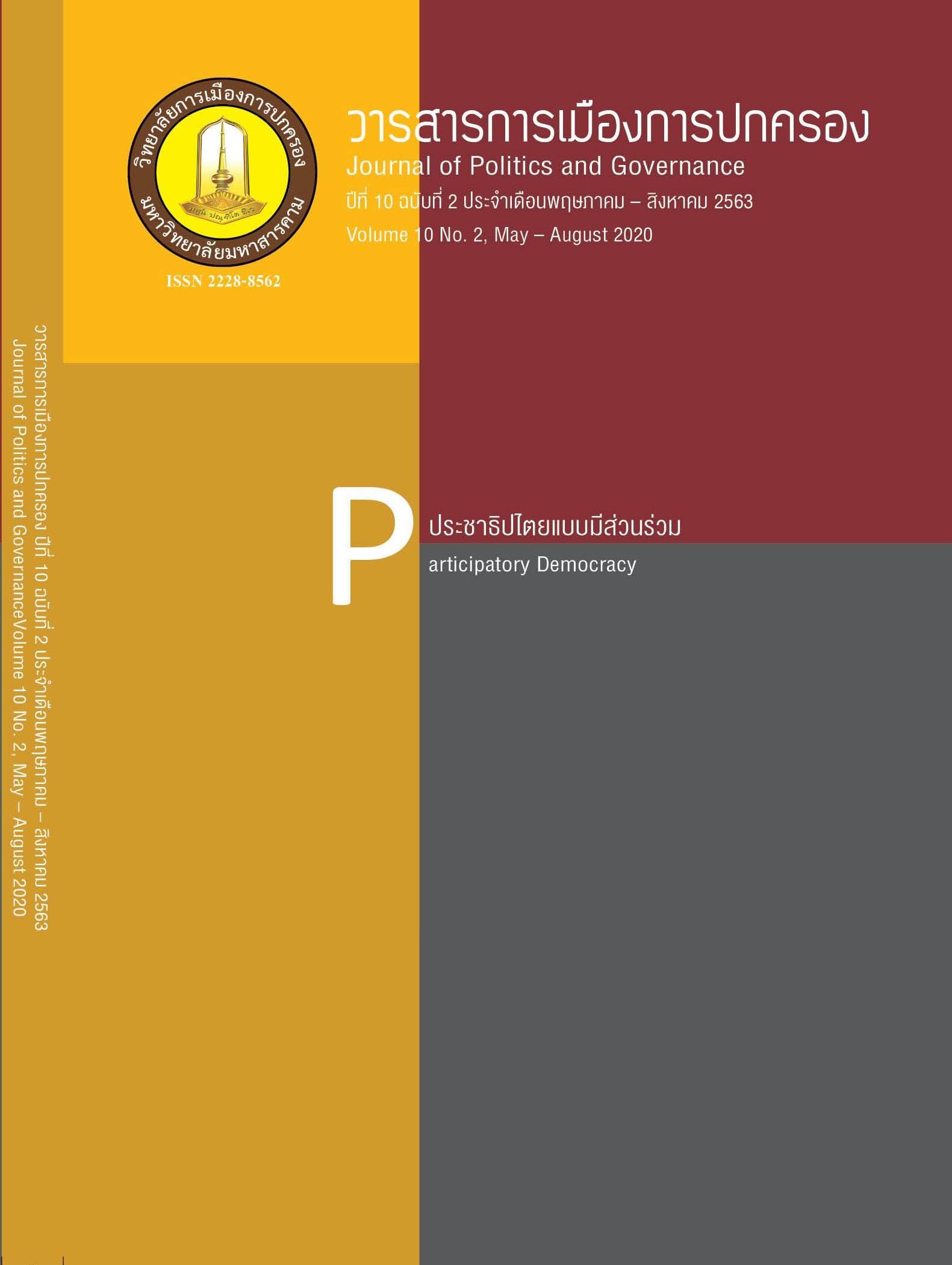Using Buddhadhamma of Community Conflict by Mediation Process in the Headman Community and the Village Committee : Study on Kwao Krang Village Moo 2 Kwao Yai Sub-Disttrict, Kantharawichai Disttrict, Mahasarakham Province
Main Article Content
Abstract
This research is entitled, “Using Buddhadhamma to resolve Community Conflict through Mediation involving the Headman and the Village Committee : Study on Khwao Krang Village Moo 2, Khwao Yai Sub-District, Kantharawichai District, Maha Sarakham Province”. A qualitative research method was conducted with field-based in-depth interviews (qualitative and field research). Three key informants were utilized, including two groups of Buddhist scholars, village headmen and village committee members 2 people conflict and was a party before 4 people, totaling 8 people. Research suggested that most conflicts founded in Khwao Krang Village were data conflict and interest conflict. The Buddha viewed that such conflicts were caused by “Miccha-ditthi” which comes from Ayonisomanasikara, Akusala-mula 3, and Papanca dhamma a dignity with “ditthi” was a central core as for the principle of the village headman and the village committee, which is the mediator used in mediation negotiations, including the principles of prejudice Agati 4, Brahmaviharadhamma , Khanti-dhamma the main principles and Yonisomanasikan for thinking analyzed conflict stories for the principle of the victims in the mediation negotiations was the apostle principle, the principle for the perpetrators of the mediation process was, kusala-mula , Akusala-mula , Hiri-Ottapa the conscience and the form of mediation negotiation that the village headman and the mediator village committee used to negotiate mediation. Compromise in Buddhism is called “Tinnawatthaka”, a principle used in the suppression of a type of conflict called “Athikaranasamatha” to settle litigation. Local folk wisdom was also used. The Isan people trust and respect their elders to resolve conflicts that occur in their communities. The negotiation of mediation using this principle of Buddhism was considered to be the management of Buddhist conflict, a peaceful method Buddhist peaceful that was used in all matters of conflict management. To creating unity and strength for the community.
Article Details
References
ชลากร เทียนส่องใจ. (2553). การเจรจาไกล่เกลี่ยคนกลางเชิงพุทธ: หลักการและเครื่องมือสำหรับการจัดการความขัดแย้ง.วิทยานิพนธ์พุทธศาสตรดุษฎีบัณฑิต สาขาวิชาพระพุทธศาสนาบัณฑิตวิทยาลัย มหาวิทยาลัยมหาจุฬาลงกรณ์ราชวิทยาลัย.
ปกรณ์ ศรีปะลาด. (2553). การไกล่เกลี่ยข้อพิพาทในพระพุทธศาสนาเถรวาท : กรณีศึกษามโหสถชาดก.วิทยานิพนธ์พุทธศาสตรมหาบัณฑิต สาขาวิชาพระพุทธศาสนา บัณฑิตวิทยาลัย มหาวิทยาลัยมหาจุฬาลงกรณ์ราชวิทยาลัย.
พระธรรมปิฏก (ป.อ.ปยุตฺโต). (2546). สลายความขัดแย้ง. กรุงเทพมหานคร : โรงพิมพ์สหธรรมิก.
พระพรหมคุณาภรณ์ (ป.อ.ปยุตฺโต). (2555). นิติศาสตร์แนวพุทธ. (พิมพ์ครั้งที่ 13) กรุงเทพมหานคร :สำนักพิมพ์วิญญูชน.
พระพรหมคุณาภรณ์ (ป.อ.ปยุตฺโต).(2555). พุทธธรรม ฉบับปรับขยาย. (พิมพ์ครั้งที่ 35). กรุงเทพมหานคร : สำนักพิมพ์ผลิธัมม์.
พรกิจ กิจจารุวัฒนากูล. (2551). การประยุกต์ใช้หลักธรรมเพื่อแก้ปัญหาครอบครัวในสังคมปัจจุบัน. พุทธศาสตรมหาบัณฑิต ภาควิชาพระพุทธศาสนา บัณฑิตวิทยาลัย มหาจุฬาลงกรณ์ราชวิทยาลัย.
มหาจุฬาลงกรณราชวิทยาลัย. (2539). พระไตรปิฎกภาษาไทย ฉบับมหาจุฬาลงกรณราชวิทยาลัย. เล่มที่ 1-33 กรุงเทพฯ : โรงพิมพ์มหาจุฬาลงกรณราชวิทยาลัย.
วันชัย วัฒนศัพท์. (2550). ความขัดแย้ง: หลักการและเครื่องมือแก้ปัญหา. (พิมพ์ครั้งที่ 3). นนทบุรี : สถาบันพระปกเกล้า.
อัจฉรียา ธิรศริโชติ. (2552). ยุติธรรมเชิงสมานฉันท์ในพระวินัยปิฎก. สังคมวิทยามหาบัณฑิต สาขาสังคมวิทยา ภาควิชาสังคมวิทยาและมนุษยวิทยา บัณฑิตวิทยาลัย คณะรัฐศาสตร์ จุฬาลงกรณ์มหาวิทยาลัย.


